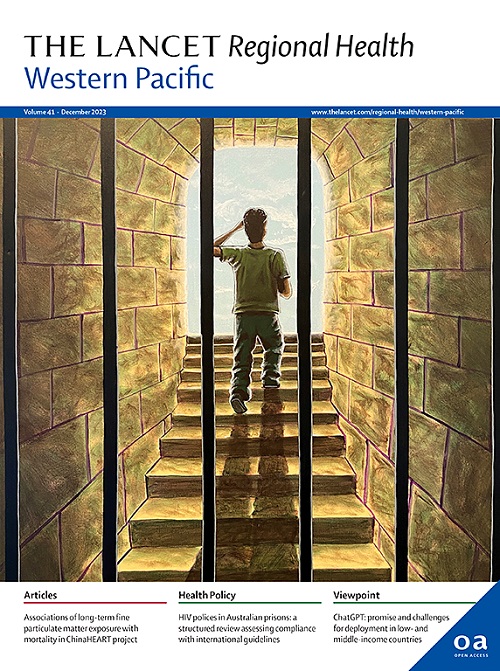Pembrolizumab单药治疗先前治疗的转移性her2阴性乳腺癌伴种系APOBEC3B缺失:II期AUROR研究结果
IF 8.1
1区 医学
Q1 HEALTH CARE SCIENCES & SERVICES
引用次数: 0
摘要
APOBEC3B基因中常见的种系缺失多态性增加了乳腺癌中体细胞超突变率,这反过来又与更大的新抗原负担和免疫激活有关。这项II期研究评估了APOBEC3B缺失多态性对转移性her2阴性乳腺癌患者对派姆单抗单药治疗的影响。方法符合条件的患者确诊为转移性her2阴性乳腺癌,既往接受过1-3次治疗,APOBEC3B基因纯合或杂合种系缺失。患者每3周静脉注射200毫克派姆单抗,持续2年。主要终点为客观有效率。次要终点是疾病控制率、无进展生存期和总生存期。临床试验注册:ClinicalTrials.gov, NCT03989089。所有入组患者(N = 44)均为女性,30%(12/40)患有pd - l1阳性肿瘤,64%(28/44)接受过≥2种既往转移性疾病治疗。客观缓解率(ORR)在pd - l1阳性人群中为20% (9/44)(95% CI, 9.8-35.3),在pd - l1阳性人群中为25% (3/12)(95% CI, 5.5-57.2)。该研究的疾病控制率(DCR)为52% (23/44)(95% CI, 36.7-67.5)。中位无进展生存期(PFS)为3.1个月(95% CI, 2.1-4.3), 6个月PFS率为27% (12/44)(95% CI, 16.8-44.2)。中位总生存期(OS)为15.5个月(95% CI, 13.0-26.5), 12个月OS率为66% (29/44)(95% CI, 53.3-82.5)。治疗相关不良事件(AE)发生在30例(68%)患者中,其中1例(2%)为3级AE。没有因ae而死亡的病例。pembrolizumab单药治疗在先前治疗的种系APOBEC3B缺失转移性her2乳腺癌患者中显示出抗肿瘤活性。这项研究由马来西亚癌症研究中心赞助,这是一个非营利性的癌症研究组织。默克夏普公司;Dohme(默沙东)通过默沙东研究者研究项目免费提供试验药物。本文章由计算机程序翻译,如有差异,请以英文原文为准。
Pembrolizumab monotherapy for previously treated metastatic HER2-negative breast cancer with germline APOBEC3B deletion: results of the phase II AUROR study
Background
A common germline deletion polymorphism in the APOBEC3B gene increases the rate of somatic hypermutation in breast cancer, which in turn is associated with greater neoantigen burden and immune activation. This phase II study evaluated the impact of the APOBEC3B deletion polymorphism on the response to pembrolizumab monotherapy in metastatic HER2-negative breast cancer patients.
Methods
Eligible patients had a confirmed diagnosis of metastatic HER2-negative breast cancer, 1–3 prior lines of therapy, and documented homozygous or heterozygous germline deletion of APOBEC3B. Patients received 200 mg of pembrolizumab intravenously every 3 weeks for up to 2 years. The primary endpoint was objective response rate. Secondary endpoints were disease control rate, progression-free survival, and overall survival. Clinical trial registration: ClinicalTrials.gov, NCT03989089.
Findings
All enrolled patients (N = 44) were women, 30% (12/40) had PD-L1-positive tumours, and 64% (28/44) had received ≥2 previous lines of therapy for metastatic disease. Objective response rate (ORR) was 20% (9/44) (95% CI, 9.8–35.3) in the total and 25% (3/12) (95% CI, 5.5–57.2) in the PD-L1-positive population. Disease control rate (DCR) for the study was 52% (23/44) (95% CI, 36.7–67.5). Median progression-free survival (PFS) was 3.1 months (95% CI, 2.1–4.3), and 6-month PFS rate was 27% (12/44) (95% CI, 16.8–44.2). Median overall survival (OS) was 15.5 months (95% CI, 13.0–26.5), and 12-month OS rate was 66% (29/44) (95% CI, 53.3–82.5). Treatment-related adverse events (AEs) occurred in 30 (68%) patients, including 1 (2%) with a grade 3 AE. There were no deaths due to AEs.
Interpretation
Pembrolizumab monotherapy demonstrated anti-tumour activity in a subset of previously treated metastatic HER2-breast cancer patients with germline APOBEC3B deletion.
Funding
This study was sponsored by Cancer Research Malaysia, a non-profit cancer research organization. Merck Sharp & Dohme (MSD) provided free access to the trial drug through the Merck Investigator Studies Program.
求助全文
通过发布文献求助,成功后即可免费获取论文全文。
去求助
来源期刊

The Lancet Regional Health: Western Pacific
Medicine-Pediatrics, Perinatology and Child Health
CiteScore
8.80
自引率
2.80%
发文量
305
审稿时长
11 weeks
期刊介绍:
The Lancet Regional Health – Western Pacific, a gold open access journal, is an integral part of The Lancet's global initiative advocating for healthcare quality and access worldwide. It aims to advance clinical practice and health policy in the Western Pacific region, contributing to enhanced health outcomes. The journal publishes high-quality original research shedding light on clinical practice and health policy in the region. It also includes reviews, commentaries, and opinion pieces covering diverse regional health topics, such as infectious diseases, non-communicable diseases, child and adolescent health, maternal and reproductive health, aging health, mental health, the health workforce and systems, and health policy.
 求助内容:
求助内容: 应助结果提醒方式:
应助结果提醒方式:


